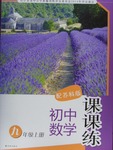题目内容
People built a bridge over the river those who died in the floods while saving others.
A. in need of B. in memory of
C. in charge of D. in praise of
B
【解析】句意: 人们在河上建了一座桥, 以纪念那些在洪水中救人时死去的人们。in memory of为了纪念; in need of需要; in charge of负责; in praise of为了赞扬。只有B项符合句意。

练习册系列答案
 课课练江苏系列答案
课课练江苏系列答案 名牌中学课时作业系列答案
名牌中学课时作业系列答案
相关题目
